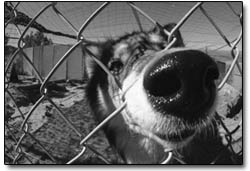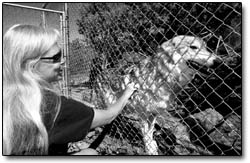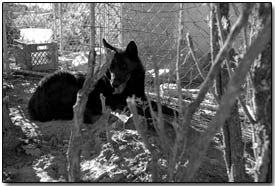|
Yukon, a wolf who recently
came to the WolfWood Refuge and Adoption Center
near Ignacio, takes a rare moment to pause for the camera
at the refuge last week./Photo by Ben Eng. |
All Paula Watson wanted that fateful day 11 years ago was a
yellow lab. But as she perused the pens at a Flagstaff animal
shelter, Winslow, a 120 pound Malamute-wolf cross, caught her
eye.
When Paula inquired about the animal, she was told by shelter
staff that he was a lost cause.
“He was scheduled for euthanasia and hadn’t been
walked in a week,” she said.
However, Paula felt a bond between herself and the dog and
asked to take him for a test walk. She was told he would likely
fight her every step of the way. Instead, as soon as they got
outside, Winslow sat down and leaned against her, peering up
at her with a trusting gaze.
Yet, Paula resisted the urge to immediately whisk him away,
knowing full well the challenges such a dog could present.
“I thought about it really long and hard,” she
said.
The decisive moment came when, upon returning Winslow to his
cage, she watched as another family approached, trying to woo
him away.
“He went to the back of the kennel and turned his back
to them,” she said.
That’s when Paula knew Winslow belonged with her, and
the two have been together ever since. But, little did she know
that the coming years of her life would be spent not only with
Winslow, but dozens of other wolves and wolf dogs just like
him, in an effort to provide a safe home for the often misunderstood,
mistreated and maligned canines.
Paula and her husband, Craig, own the WolfWood Refuge and Adoption
Center, a no-kill wolf dog sanctuary near Ignacio. For the past
several years, the couple has made it their mission to save
unwanted wolves and wolf dogs.
“We very rarely turn down animals if we can help it,”
said Paula, adding that WolfWood is one of the few – if
not the only –sanctuary of its kind still accepting animals.
However, after saving more than 70 dogs and seven years in the
“business” (WolfWood is a registered nonprofit),
the Watsons still find themselves running up against the same
old myths and misconceptions – namely that the animals
are dangerous and noisy.
While this may be true of mistreated animals, Paula pointed
out that in North America, there has never been a reported attack
by a wild wolf on a human. Furthermore, WolfWood’s animals
are kept in pens with 8-foot chainlink walls with 4-foot fencing
around the perimeter to deter any animals from digging out.
“We get hurt by the fences more than the dogs,”
said Paula. As far as noise, she said for the most part the
dogs are silent – a fact that was corroborated by an independent
study commissioned by the county.
“Before someone talks badly, I’d like to tell them
to come up and visit,” she said. “I’m sorry
if someone is afraid, but that has nothing to do with what the
animals are doing.”
 |
Above: A curious Lakota peers through
his pen at visitors last week. There are more than 70
dogs at WolfWood, several of whom are available for
adoption provided prospective owners meet stringent criteria,
according to Paula Watson. Below: Paula Watson gives Thunder,
the biggest animal at the WolfWood Refuge, a scratch.
Thunder, who came to the refuge by way of Canada, is kept
in a pen by himself because he does not do well with other
animals.
“Basically, he has no impulse control,” Paula
said, a result of being taken away from his pack at too
young an age./Photo by Ben Eng.
|
 |
A place to call home
Tucked up against a hillside at the end of a dirt road bordering
Southern Ute tribal land, the 40-acre parcel that makes up WolfWood
is the refuge’s second home. Its first home was in Archuleta
County, but as the refuge grew, the Watsons found themselves
at odds with neighbors over noise. Rather than fight, in early
2002 the Watsons moved the entire operation to a bigger, more
isolated location in rural La Plata County. More than half a
mile from their nearest neighbor, the Watsons thought the new
location would serve them well. However, they soon not only
ran afoul of neighbors but county regulations, which require
a permit for such an operation.
The Watsons, who did not need a permit in Archuleta County,
set about complying with La Plata County codes. However, the
approval process was marred by opposition from neighbors. And
although the La Plata County Planning Commission recommended
denial of the permit, county commissioners ultimately awarded
WolfWood its permit last March.
“Things have settled down because we’re cool with
the county and have our permit,” Watson said.
Nevertheless, she added that the battle is ongoing. This summer,
the Watsons filed a slander lawsuit against neighbors, who they
allege cost them a grant from Purina for free dog food (WolfWood
has since secured food from another anonymous source, Paula
said), and another suit against TV station KREZ for trespassing.
Just last week, the Watsons were visited by rifle-toting neighbor
on a four-wheeler, Paul said.
“Who knows what his motivation was,” she said.
Despite all this, the Watsons say it is not their intent to
make waves, and love them or leave them, the wolf dogs are here
to stay.
“I’m not moving again,” she said. “The
last move took everything we had – mentally, emotionally,
physically and financially. We’ve done nothing but fight
battles, and we’re tired. We want to spend our time, energy
and money on the animals instead of fighting battles.”
 |
| Rain, a female wolf dog who
shares a pen with Yukon, rests in the afternoon shade of
some scrub oak. WolfWood is strongly opposed to the further
breeding of wolf dogs, and every animal at the shelter is
either sterilized or put in a pen with an animal who is./Photo
by Ben Eng. |
Overcoming myths
In her 11 years of dealing with wolves and wolf dogs, Paula
Watson has become somewhat of a self-taught expert on the animals.
“I’ve gotten where I am with lots and lots or reading
and lots and lots of experience,” Paula said, who refers
to herself as “mom” when talking about her animals.
With more than 70 dogs under her care, she spends the major
part of every day cleaning pens and feeding the animals, which
go through 300 gallons of water every few days and around 300
pounds of dog food a day. Her husband, Craig, returns every
night from his 12-hour shift at a coal mine to water the dogs.
Paula says there are a number of misconceptions regarding the
animals, including a misplaced sense of mystique and power equated
with them – and her Spartan lifestyle is proof of that
fallacy. She said a woman at another dog shelter once remarked
that saving dogs was not as “glamorous” as saving
wolves.
“I said, ‘Oh yeah,’ as I’m covered
in poop,” Paula laughed. “I don’t have running
water; I don’t have a house.”
Regardless, she said it is this perception that leads to the
predicament many wolf dogs and their owners find themselves
in.
“People think it’s going to be really cool (to
have a wolf dog); it’s an ego thing,” she said.
“It gives people some sort of sense of power to say, ‘I
have power over a wolf,’ but thinking like that is sheer
craziness.”
Paula said when handled correctly, wolf dogs can be docile,
loyal and friendly. However, their immense strength, independence
and intelligence demand a different approach than the typical
dog.
“You cannot control them physically,” she said,
adding that tone of voice works better than anything. “If
you get a golden retriever, you pretty much know what characteristics
to expect. If you get a wolf dog, it’s like having a 3-year-old.
Every single one is different.”
However, most wolf dog owners don’t have the time or
means to get to know their animal and work with it. As a result,
they become disinterested and frustrated, which can lead to
neglect, ill treatment or worse.
“Eight of 10 wolf dogs end up dead before they’re
two,” she said. “They’re euthanized, shot,
or a lot of their owners let them loose and they starve. People
decide they don’t want them anymore and somehow, they
end up dead.”
Healing wounds
Further compounding the problem is that many animal shelters
make it a policy to euthanize wolf dogs because of their unpredictable
nature.
“Most shelters don’t want the job of adopting out
wolf dogs,” she said.
And that’s where WolfWood comes in. The La Plata County
Humane Society, as well as other dog rescue operations including
the Utah-based Best Friends, works with WolfWood, sending dogs
its way.
And although some of the dogs are well cared for, arriving
upon the death of a master, many more come to WolfWood with
deep physical and emotional wounds.
Buddy and Tonka were two of WolfWood’s first saves. They
came from a shelter in Arizona, and prior to that had been the
victims of gross neglect.
“They hadn’t been touched in six months,”
Paula said. “Buddy weighed 50 pounds less than he does
now.”
Other animals arrive at the shelter sick, starving or with
chain collars embedded in their necks. However, Paula boasts
a 100 percent success rate in saving the animals that come her
way. In WolfWood’s seven years, she has had to euthanize
only one dog –Sky, a female Arctic wolf with an inoperable
tumor.
“She was in a whole lot of pain,” Paula said.
Perhaps the biggest success story at WolfWood is Rufio, a male
wolf dog who was found next to a dead dog in a 2-by-2-foot pen
on the Apache-Jicarilla reservation.
“It took us five hours to get him from his kennel to
the truck” Paula recounts. “I went into his pen
300 times, no lie, and he would growl at me. On the 301st time,
he decided people are a good thing and came out. Now, he loves
everybody.”
In fact, some of the animals at WolfWood have been rehabilitated
to the point where they can be adopted out, although the Watsons
require a rigorous application process.
“Our philosophy is we’ve saved them once; we don’t
want to do it again,” Paula said.
Nevertheless, she admits not every animal that comes to the
shelter has such a miraculous transformation. Most are unadoptable,
and some pens at WolfWood are marked with orange caution tape,
signifying the more aggressive or troubled of the lot.
Thunder, who came to the shelter a few years ago via Best Friends,
falls into the orange flag camp. The largest animal at WolfWood,
weighing in at 160 pounds in full winter coat, he gets his own
pen even though it is WolfWood’s practice to put at least
two animals to a pen for companionship.
While Thunder is seemingly friendly, leaning up against the
fence for back scratches, he suffers from deep-seated behavioral
problems that can be set off by anything from approaching him
while he’s eating to the scent of patchouli oil. “You
can’t dominate an animal like Thunder,” she said.
“He has a whole lot of issues.”
Paula believes Thunder’s problems stem from being taken
away from his pack at 10 days old, thus never learning his boundaries.
He likely came from a breeder whose sole purpose was to make
money off wolf dog pups. WolfWood strongly opposes breeding
wolf dogs – all animals are either sterilized or penned
with ones who are – but Paula says there are at least
three local wolf dog breeders that she knows of – including
a woman who sells them out of her trunk for $100 at the flea
market.
“The only reason to breed them is for the money,”
she said.
And, the way Paula sees it, as long as this continues, so will
the refuge. Nevertheless, she challenges – welcomes, even
– anyone who will put her out of work.
“We’re trying to be part of the solution. Why not
go after the problem?” she said. “Please, put me
out of business. I would love to be put out of business.”

